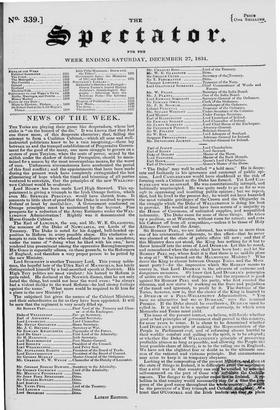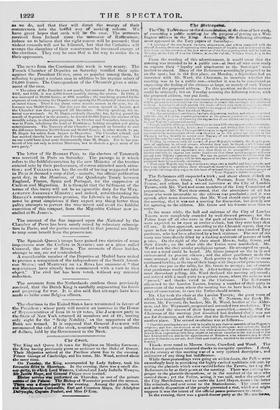NEWS OF THE WEEK.
THE Tories are playing their game like desperadoes, whose last stake is "on the hazard of the die." It was known that they had one throw more, of this desperate character; that, failing the attempt to form a Coalition Cabinet,.—which all sane and well- instructed politicians knew to be a vain imagining,—there lay between us and the tranquil establishment of Progressive Govern- ment for the good of the many, one more struggle to govern on a system of pure Toryism, when the seats of power, seized by the selfish under the shadow of doting Prerogative, should be main- tained for a season by the most unscrupulous means, for the worst of uses. Unforeseen circumstances have accelerated the period of this final conflict ; and the appointments that have been made during the present week have completely extinguished the last glimmering of hope which the timid and trimming of all parties ventured to entertain, that the principles of the new WELLING- TON Cabinet would be moderate.
Lord RODEN has been made Lord, High Steward. This ap- pointment is giving a triumph to the Irish Orange faction, which even Mr. SPENCER PERCEVAL would have shrunk from. It amounts to little short of proof that the Duke is resolved to govern Ireland at least by martial-law. A Government conducted on Orange principles must be maintained by the bayonet. Fine prospects for a reduction of the Army Estimates under theWEL- LINGTON Administration ! Rightly was it denominated the Horse-Guards Cabinet.
The Earl of LINCOLN, the son, and Mr. W. E. GLADSTONE, the nominee of the Duke of NEWCASTLE, are Lords of the Treasury. The Duke is noted for his dogged, bull-headed op- position to Reform in every possible shape. His vindictive at- tempts to ruin the voters who refused obedience to his mandates, under the name of " doing what he liked with his own," have rendered him preeminent among the oppressive Boroughmongers. His Grace is especially odious, on these grounds, to the Reformers of England, and therefore a very proper person to be petted by the new Ministry.
Lord STORMONT is another Treasury Lord. This young noble- man, the hopeful heir of the Ultra Earl of MANSFIELD, has lately distinguished himself by a foul-mouthed speech at Norwich. His High Tory politics are most virulent : his hatred to Reform is quite rabid. He declared at the Norwich dinner, that he not only bated the thing, but could not bear the word even: "he always had a violent dislike to the word Reform—he had strong feelings against the name." What more could be required to fit him for a place in the new Ministry ?
The subjoined list gives the names of the Cabinet Ministers, and their subordinates as far as they have been appointed. It will be seen that the regiment is very nearly filled up.
Sir ROBERT PEEL First Lord of the Treasury and Chan- ce m of the Exchequer. Duke of WELLINGTON For gn Secretary.
Earl of ABERDEEN Colonial Secretary.
Lord LYNDHURST Lord Chancellor.
Mr. HENRY GOULBURN Home Secretary. Mr. J. C. HEP RIES Secretary at War. Sir EDWARD KNATCHBULL Paymaster of the Forces. Lord DE GREY First Lord of the Admiralty. Sir H. HARDINGE Irish Secretary. Lord MARYBOROUGH Post- Master-General.
Lord ROSSLYN President of the Council.
Lord WHARNCLIFFE Lord Privy Seal.
Mr. ALEXANDER BARING President of the Board of Trade.
Lord ELLENBOROUGH President of the Board of Control.
Sir GEORGE MURRAY Master-General of the Ordnance.
Mr. CHARLES W. W. WYNNE Chancellor of the Dutchy of Lancaster.
Mr. GEORGE ROBERT DawsoN Secretary to the Admiralty. Sir GEORGE COCKBURN Lord of the Admiralty. Mr. MAURICE FITZGERALD Ditto.
Sir JOHN POER BERESFORD Ditto.
Sir CHARLES ROWLEY Ditto.
Lord ASHLEY Ditto.
Mr. YATES PEEL Lord of the Treasury. LOld LINCOLN Ditto.
Lord STORMOIIT Ditto.
Mr. CHARLES ROSS Lord of the Treasury.
Mr. W. E. GLADSTONE Ditto.
Sir GEORGE CLERK Secretary of the;Treasury.
Sir T. FREEMANTLE Ditto.
Viscount LOWTHER Treasurer of the Navy.
Lord GRANVILLE SOMERSET Chief Commissioner of Woods and
Forests.
Mr. W. PRAED Secretary of the India Board. Mr. J. PLANTA One of the India Board. Lord EDWAnD SOMERSET Surveyor-General of the Ordnance. Sir EDWARD OWEN Clerk of the Ordnance.
Mr. F. R. BOXHAM Storekeeper of the Ordnance. Colonel PERCEVAL Treasurer of the Ordnance. Mr. STUART WORTLEY Under-Secretary of the Colonies.
Lord MxmoN Under Foreign Secretary. Earl of HA DDI NGTOST Lord Lieutenant of Ireland.
Sir EDWARD SUGDEN Lord Chancellor of Ireland. Sir JAMES SCARLET? Lord Chief Baron of the Exchequer.
Sir FREDERICK POLLOCK Attorney-General. Sir W. FOLLETT Solicitor-General.
Sir IV. RAE Lord Advocate of Scotland. Sergeant PENNEFATHER Attorney•General for Ireland. Mr. DEVONSHER JACKSON Solicitor-General for Ireland.
.111•••••
Earl Of JERSEY Lord Chamberlain.
Earl of ROPES Lord Steward.
Duke of DORSET laster of the Horse.
Lord FORESTER Master of the Buck Hounds.
Earl Howx Earl of DENBIGH Queen's Lord Chamberlain. Queen's Master of the Horse.
"The Duke" may well be called "a bold man." He is despe- rate and foolhardy in his ignorance and contempt of public opi- nion. Lord CASTLEREAGH would have shuddered at the risk of forming such a Cabinet as the Duke has formed. Yet Lord CAS- TLEREAGH was no coward. He was constitutionally intrepid, and habitually unprincipled. He was quite ready to go as far as was
safe in oppressing and insulting public opinion ; but we repeat, that, had he lived to the present day, he would not have hazarded
the most valuable privileges of the Crown and the v in the struggle which the Duke of WELLINGTON is doing his best to provoke. He would at least have been secure of' a majority in the House of Commons, of unlimited supplies, and unqualified indemnity. The Duke cares for none of these things. He takes up a position, as at Waterloo, without room for retreat; and cuts his Cabinet off from all sympathies,—unless it be those of Holy Alliance Princes and the Army. Sir ROBERT PEEL, we are informed, has written to more than one of his aristocratical adherents, to this effect—that he never was alarmed at the state of public affairs till now; and that if
this Ministry does not stand, the Kinr, has nothing for it but to throw himself into the arms of Lord DURHAM. Let this be noted, and remembered when the stake shall have been lost; and let Sir ROBERT PEEL say, whose fault it is that there is no middle place to stop at ? Who turned out the MELBOURNE Ministry? Who drove the King to choose between Orange Tories and the Move
meat party ?—for the impression which Sir ROBERT means to convey is, that Lord DURHAM is the advocate of extreme and
dangerous measures. We know that Lord Deanam's principles of action are the reverse of dangerous ; but the argument is good against Sir ROBERT PEEL and his party, who first created the
dilemma, and now strive by working on the fears and prejudices of the timid and ignorant, to profit by it. The doctrine of the Tories, however, now is, that the choice of the King is limited to
a DURHAM Or LI PEEL-WELLINGTON Administration. •4 You have no alternative but me or DURHAM," says the nominal Premier. If the Duke should be overthrown, Duen.vm must be called in. it is said to be a matter of necessity, to which even Monarchs and Tories must yield.
The issue of the present contest, we believe, will decide whether good or bad principles of government shall prevail in this country, for some years to come. It is about to be determined whether
Lord DurtuAst's principle of makincrb the Representation of the People in Parliament real, and of reforming abuses hurtful to
their worldly comfort and galling to the spirit, is to be adopted ; or whether the Duke of 'WELLINGTON'S principle of preserving profitable abuses as long as possible, and allowing the People the least possible share of liberty, is to be the ruling one in England. We have not the slightest fear or doubt as to the ultimate suc- cess of the rational and virtuous principle. But circumstances may arise to keep it in temporary abeyance. Looking at the composition of the present Mbi/tryegyjAhen at
the state of things in Ireland, it is difficul aftifttbe-so,Ocktts.ton that a civil war in that country can on bis'avOgle4 by 'intim I self-command on the part of those w 'the Catk masses. The danger to the popular ca4sdiii'elnd. AF hellion in that country would necessaril 'stop Vii.sa: riffle :the gress of the good cause throughout the holesvountry. TIt be the precursor of a Tory triumph and Cathoric_slatightere trust that crCosmcm. and the Irish leader& !eke Ihket,so plain as we do, and that they will direct the energy of their countrymen into the litlefu4 way ef seekiag redrew. We have great hopes that such will be• the case. The atetsunts remised from Ireland since the latesaaere of Ratheormac, induce us to believe that the right course will be pursued; that violent councils will not be followed, but that the Catholics will avenge the slaughter of their countrymen by increased energy at the elections. They may be sure that is the way to strike devil their oppressors.

















